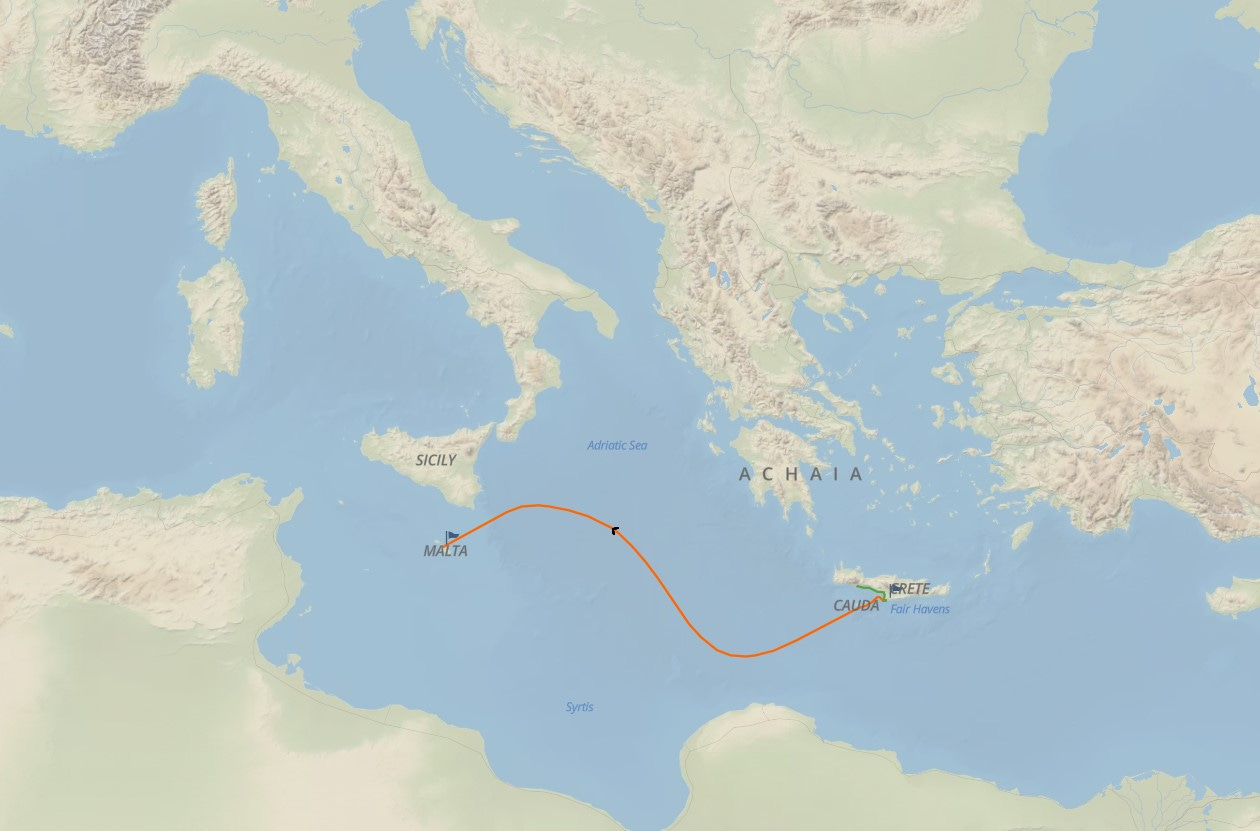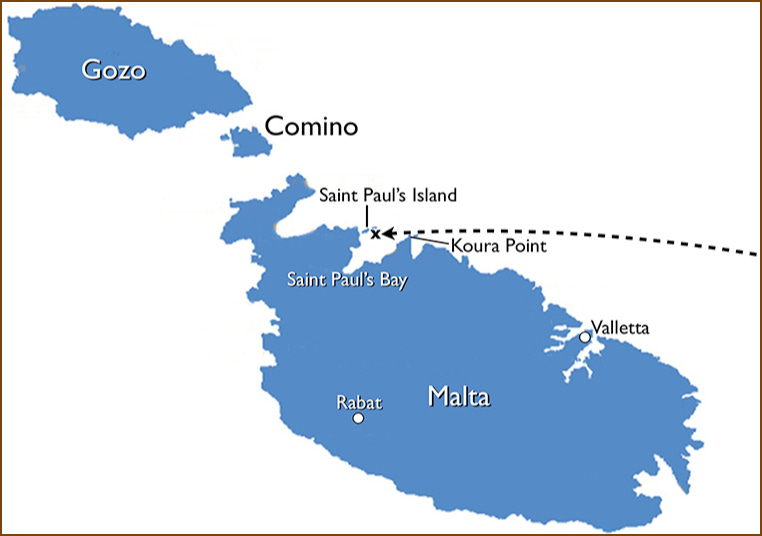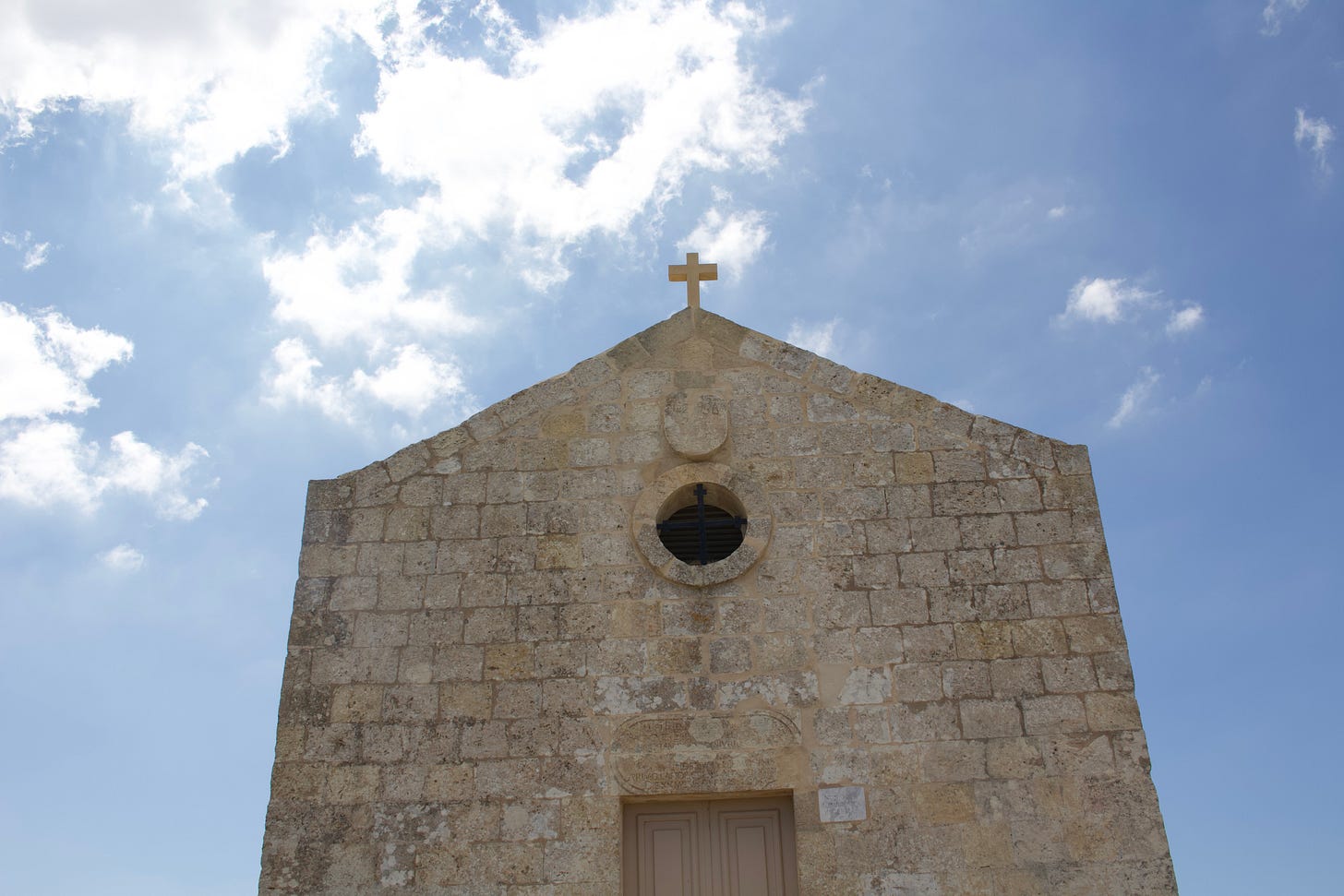A Study of Acts: The Shipwreck
Acts 27:27-44 - Biblical leadership relies on trust, initiative, good judgment, authority, strength, no compromise on absolutes, and setting an example to others.

“But when the fourteenth night came, as we were being driven about in the Adriatic Sea, about midnight the sailors began to surmise that they were approaching some land. They took soundings and found it to be twenty fathoms; and a little farther on they took another sounding and found it to be fifteen fathoms. Fearing that we might run aground somewhere on the rocks, they cast four anchors from the stern and wished for daybreak. But as the sailors were trying to escape from the ship and had let down the ship’s boat into the sea, on the pretense of intending to lay out anchors from the bow, Paul said to the centurion and to the soldiers, “Unless these men remain in the ship, you yourselves cannot be saved.” Then the soldiers cut away the ropes of the ship’s boat and let it fall away.
Until the day was about to dawn, Paul was encouraging them all to take some food, saying, “Today is the fourteenth day that you have been constantly watching and going without eating, having taken nothing. Therefore I encourage you to take some food, for this is for your preservation, for not a hair from the head of any of you will perish.” Having said this, he took bread and gave thanks to God in the presence of all, and he broke it and began to eat. All of them were encouraged and they themselves also took food. All of us in the ship were two hundred and seventy-six persons. When they had eaten enough, they began to lighten the ship by throwing out the wheat into the sea.
When day came, they could not recognize the land; but they did observe a bay with a beach, and they resolved to drive the ship onto it if they could. And casting off the anchors, they left them in the sea while at the same time they were loosening the ropes of the rudders; and hoisting the foresail to the wind, they were heading for the beach. But striking a reef where two seas met, they ran the vessel aground; and the prow stuck fast and remained immovable, but the stern began to be broken up by the force of the waves. The soldiers’ plan was to kill the prisoners, so that none of them would swim away and escape; but the centurion, wanting to bring Paul safely through, kept them from their intention, and commanded that those who could swim should jump overboard first and get to land, and the rest should follow, some on planks, and others on various things from the ship. And so it happened that they all were brought safely to land.”
Acts 27:27-44 NASB1995
Fourteen days have now passed with the ship being tossed around in the stormy conditions that started near the small island of Cauda south of Crete. Their location is noted to be the Adriatic Sea; this is, in present-day maps, actually the Ionian Sea with the modern Adriatic Sea being further north between the Balkan Peninsula and Italy. They are nearing the island of Malta.
The crew is awake at midnight and they are surmising they might be approaching land so they do depth soundings. First, the depth is about twenty fathoms (120 feet); a short time later it is 15 fathoms. Fearing they are about to be grounded on rocks, some of the sailors let down the ship’s boat on the pretense that they are setting four anchors from the bow. Paul sees that they are trying to escape from the situation and warns the centurion and the soldiers that all must remain with the ship for all to be saved. The crew listens to Paul, remembers that he has usually been right about things, and they cut away the ropes of the ship’s boat and let it fall away.
Some of the commentary I read for this part of Acts 27 had a cautionary tone about trying to spiritualize the four anchors. Here is Pastor J. Vernon McGee, quoted in Precept Austin:
Perhaps I should mention here that I have heard sermons on "Four Anchors," and those anchors have been labeled about everything under the sun. Let us not fall into the trap of trying to spiritualize something which is very practical and very realistic. These men were in a ship and they were approaching land. Since they didn't want to be cast upon the rocks, they threw out four anchors. It required all four to hold the ship. If you started to guess how many anchors it would take to hold you or to hold me, you would be trying to spiritualize this passage. In my judgment, that is a very foolish way to handle the Word of God. (Thru The Bible with J. Vernon McGee).
Not everything in the Bible is an allegory or a mystical representation of something. In this case, this is a real situation involving a real ship in dire sea conditions. Paul does sense, however, that God’s promise that they will all survive only works if all of them stay together.

As the day breaks, Paul encourages the people on board to eat something to sustain themselves. There was food on board, but the sea conditions probably kept many or most from eating. Steve and I have been quite fortunate in our lives to have never experienced seasickness although we have done many voyages on the ocean in boats and ships of all sizes, encountering rough seas a number of times. I’m not sure how we would fare under these less-controlled circumstances. Paul again reminds them that they will not perish, so they are encouraged and they take food and eat it. He also thanks God in their presence for the food, reminding them that He sustains us. Paul never misses an opportunity to tell others about God, as noted in this commentary from Pastor Stephen Cole quoted on Precept Austin:
When God encouraged Paul through the angel’s promise, Paul didn’t keep it to himself. Neither did he make everyone think that he was just a positive person, and that they all should keep a positive outlook as well. He used the situation to tell them about God, about his trust in God, and to promise that God would spare all of their lives through this ordeal. When he encouraged them all to eat some bread, Paul could have thought, “These are pagan men. Why ask God’s blessing on the food in front of such rough men?” But rather, he openly gave thanks to God in the presence of all (Ac 27:35). In times of trial, people are especially open to spiritual things. When life is out of control, and nothing seems to be working, people are open to hear about a God who is in control. We should not hesitate to be bold to tell them about the true and living God and the eternal life that He offers them through His Son, Jesus Christ.
People can be more receptive to hearing about God in times of trial, but sadly many will walk away when things go well again, so we should be bold about telling them that God is there in all circumstances.
Luke counts the total ship’s complement as 276 persons. After they eat their fill, the crew begins discarding the cargo of wheat. At this point, they can now see land, although they don’t recognize it. There is a beach and a bay that would make a good aim point for the ship. The anchors are thrown off and the foresail is hoisted. The ship runs aground on a reef or sandbar before they can reach the beach and begins to break apart. The soldiers want to kill the prisoners to keep them from escaping, but the centurion Julius, who apparently now trusts the word of Paul over his own troops, stays their hand. The centurion commands those who can swim to jump overboard and for the rest to grab planks and other floating items from the ship. All 276 persons were brought safely to land! Here is a map, showing St. Paul’s Island and Bay and the approximate location on the island of Malta (I found this map on Precept Austin and it is a bit strange with the inverted colors - the islands are in blue).
John MacArthur, quoted on Precept Austin, has a marvelous description of the Biblical leadership of Paul:
Looking back over this dramatic episode in Paul's life, several key principles of true biblical leadership can be clearly seen.
First, a leader is trusted. Paul was an important prisoner, whose escape or death would have meant serious trouble for Julius. Yet somehow during the brief journey from Caesarea to Sidon, Paul convinced the centurion that he could be trusted. Julius therefore let him leave the ship to be ministered to by the Christians there.
Second, a leader takes the initiative. At the council at Fair Havens, Paul, although a prisoner, did not hesitate to give his advice.
Third, a leader uses good judgment. Had the centurion and sailors heeded Paul's sound advice, they would have been spared a terrible ordeal—and the loss of the ship.
Fourth, a leader speaks with authority. In the midst of the raging storm, Paul's confident assertion that all on board would be saved must have seemed like madness. But his unshakable confidence in God's Word caused him to speak out boldly. Paul also called others to obedience; he was the one who prevented the sailors from abandoning the rest of the passengers (Acts 27:31).
Fifth, a leader strengthens others. Paul three times encouraged the terrified passengers and crew (Acts 27:22, 25, 34)—twice not to lose hope and once to eat. His calmness, confidence, and optimistic trust in God also reassured the others.
Sixth, a leader never compromises his absolutes. Paul prevented the crew from prematurely abandoning the ship. God had said that all would be saved, but all must remain together, and Paul refused to compromise on that instruction.
Seventh, and most important, a leader leads by example. Believing God would do exactly as He said, Paul set an example for the others by remaining calm and confident. Realizing they needed to eat before attempting to get ashore, Paul "took bread and gave thanks to God in the presence of all; and he broke it and began to eat" (Acts 27:35). His example motivated the others, "and they themselves also took food" (Acts 27:36). Leaders do not push people from behind; they lead them from the front.
These timeless principles of leadership, manifested in the midst of appalling circumstances, reveal Paul as the godly leader he was. They must characterize every leader who wishes to effectively lead God's people. (See Acts 1-28 MacArthur New Testament Commentary)
If you are a leader of other believers, this is a great checklist that you can use to assess your strengths that God has given you. As an aside, we visited Malta on a cruise in 2018 and docked near the capital city of Valletta as noted on that map. It is a fascinating place, with a long history of conquest because of its location south of Sicily and near Tunisia, and also a long history of Christian belief. Here is a small and ancient church we saw on the west side of the main island of Malta during a tour:
Photograph Copyright © 2018 Steven Sande.
My next devotional begins the last book of Acts, Acts 28, and will examine verses 1-6 - The natives treat the shipwrecked group kindly; Paul has a viper attach itself to him. As noted in the last devotional, I will summarize what I gleaned from Acts after I finish Acts 28 and then will dive into the challenging book of Daniel.
Heaven on Wheels Daily Prayer:
Dear Lord - Please help to cultivate those attributes of leadership that I can use in my roles as a Bible devotional writer, prayer warrior, and wife of a believer. Amen.
Scripture quotations taken from the (NASB®) New American Standard Bible®, Copyright © 1960, 1971, 1977, 1995 by The Lockman Foundation. Used by permission. All rights reserved. lockman.org
Precept Austin was accessed on 2/17/2025 to review commentary for Acts 27:27-44.




